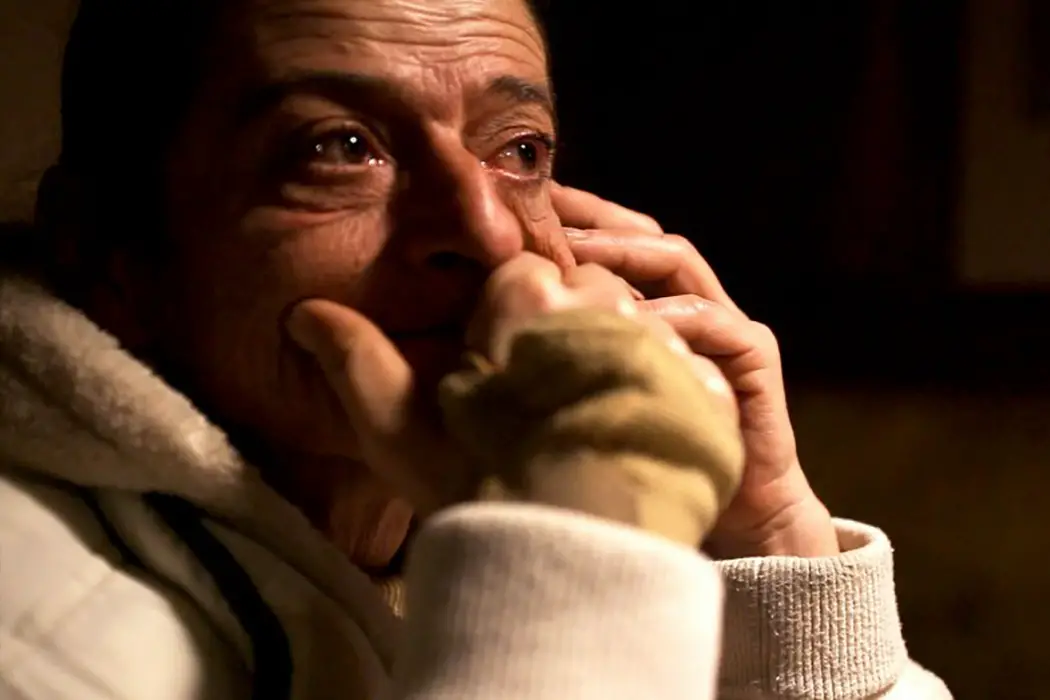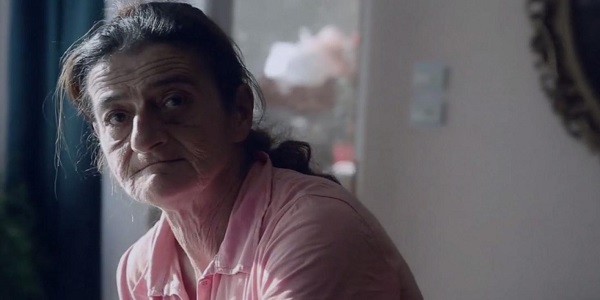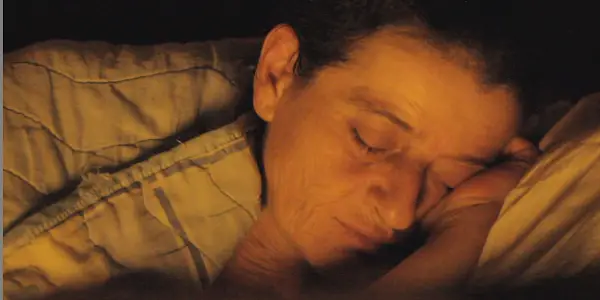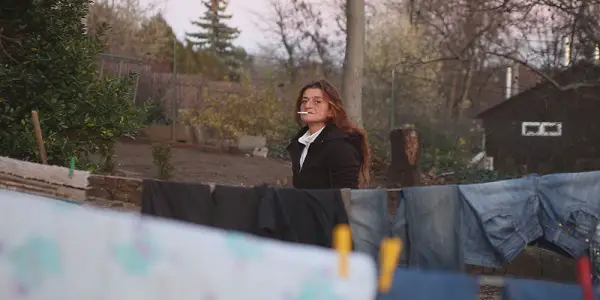Sheffield Doc/Fest 10: A WOMAN CAPTURED: Astonishing Access Into Life Of A Slave (& Interview With Director Bernadett Tuza-Ritter)

Musanna Ahmed is a freelance film critic writing for Film…
High up on the list of the audience’s favourites, Bernadett Tuza-Ritter’s startling modern slavery doc A Woman Captured was undoubtedly a highlight at the Doc/Fest and will be one of the highlights of the year too. The film follows Marish, a factory worker and servant for Eta, a woman who doesn’t work a day in her life because the servants in her employ do everything for her – including paying her the entirety of their menial jobs’ wages so they can have a roof over their heads.
A Woman Captured
Marish earns 550 Euros working a 12-hour factory shift and is expected to give it all to Eta, who in return offers accommodation and the ability to “live like her”, which we learn means nothing more than being able to eat food and smoke cigarettes. Marish is cut off from her family, she can’t travel outside the house without Eta’s knowledge and, most dishearteningly, is offered no support from the police who know that contemporary slavery is a phenomenon but supposedly can’t do anything about it.

Marish is around 50 years old but the senescence of her face and lack of teeth suggest a much higher figure. It’s this disconnect in her age and appearance that attracted the director to her. The horrible truth is that Marish has lived in slave-like conditions for longer than her time with Eta. One can only imagine the level of abuse she’s been subject to in the later years of the life. The remarkable thing is that her character is unbroken. The mental torture is more extreme than the physical but Marish is strong, resilient and is very careful in navigating situations so as not to compromise her shot at freedom or at least to ease the pain.
One of the focal points in the zeitgeist of this year’s cinema is how memorable Marvel’s villains have been, between Black Panther’s provocative nemesis Killmonger and Infinity War’s literally world-shattering villain Thanos. It’s silly to compare fictional characters to real ones, but neither make an impression quite as indelible as Eta. She’s a physical and emotional abuser of the worst calibre, but her power trip completely undermines the intelligence of those around her, including Marish and Tuza-Ritter. The filmmaker explained in the post-screening Q&A that she gained intimate access to her subject’s life because Eta didn’t think that a “young, stupid filmmaker” was of any concern.
The most remarkable thing about Tuza-Ritter’s presentation of Marish’s story is that she shoots her film entirely in close-up. It’s a harrowing subjective experience and made even scarier with the faceless villain off-screen. We never see Eta – we only hear her harsh words in her harsh tones. Haunting elongated notes of music are deeply affecting and effective in punctuating the evilness of her nature. The filmmakers’ focus on only shooting the one woman, the enslaved Marish, highlights the brilliant double entendre in the film’s title.

If it all sounds too depressing, it’s worth assuring viewers that it’s ultimately a hopeful film. But to write more about Marish’s journey in the film would be to diminish the emotional impact of the story. A Woman Captured is an astonishing documentary of a buoyantly spirited woman and the filmmaker she entrusts in sharing her life story. Overall, the most valuable thing achieved by A Woman Captured is that it raises awareness of modern slavery in societies where it could easily be invisible. It could be happening to one of your neighbours.
Interview with Bernadett Tuza-Ritter
I spoke to Bernadett Tuza-Ritter at the festival about her relationship with her subject, shooting the film, and how viewers can help those in similar situations to Marish.
You’ve spoken of having the objective of shining a light on modern slavery when you started this film. As your relationship with Marish developed, how did it affect your objectives and did you know how long you would be shooting?
Bernadett Tuza-Ritter: No, I didn’t know how long I was going to be shooting and I started this as a different project. I was not aware of her situation at first. I wanted to make a 5-minute short about the day of a person because I applied to a Hungarian film school to study directing and this is what they asked for. I had the visual concept of only wanting to show one face in my film and I met [Eta’s] family a few years earlier through a friend of mine. I saw that they had servants but I saw that [the servants] were paid. I couldn’t forget Marish’s face because I knew she was around 50 but looked so much older.
So, when I had this visual concept, I called the family to ask if I could shoot a few days with Marish and I wouldn’t show anyone else’s face in my film. They allowed me to shoot and, during those early days of shooting, she told me that she wasn’t actually being paid. That was the first time where [the film] changed and I kept shooting.
This achievement of shooting the whole film in close-up, it reminds me of Son of Saul…
Bernadett Tuza-Ritter: Son of Saul wasn’t an influence because we started in the same year and didn’t know about each other’s films, so it was by chance that we did the same thing.

Right. Did you have any visual references for your style?
Bernadett Tuza-Ritter: I’m coming from fiction because I’ve worked as an editor and a script supervisor on set for 10 years. I think I was influenced by general fiction, mainly Romanian cinema which has a really pure style of storytelling.
Everybody is stunned by the incredible access you had for this film, how intimate it was, but was there anything you wanted to capture but weren’t able to?
Bernadett Tuza-Ritter: I mean, it’s difficult when you’re shooting in a dangerous environment because you always need to be aware of the borders and what you can do but what was really important for me was that [Marish] felt good when I was there. I told her to tell me to stop shooting if she didn’t feel comfortable at any point. I did put the camera down sometimes because she asked me to but otherwise it was clear for me what I wanted to tell in my film so I focused on capturing those moments. You can’t capture everything but you always try to focus on what you need for the editing room to reconstruct the reality.
That’s especially significant because you were the DP too and no one else had a camera. Are there any things you would love for the audience to know about that you couldn’t capture?
Bernadett Tuza-Ritter: I can’t remember if there was anything I felt that way about. Of course, I remember scenes which I missed because I was on my own and didn’t have a production crew so I wasn’t able to gain access or find a different place to shoot. I had many ideas but couldn’t do more than what I was able to.
Just over the halfway point of the film, we learn about Marish’s backstory where she was in a previous household that was also abusive. When someone watches the film, they may wonder from the outset how she got to where she is, so what was behind the decision to delay the context of her circumstance?
Bernadett Tuza-Ritter: This was an editorial decision because I wanted the film to raise questions but at the same time I didn’t want to make a film which worked through interviews. I did capture her telling me her background but I felt that the film changes its style immediately when we are sitting and talking too much. It was so important for me that it should be an observational film.

There’s a moment in the film where the text on-screen tells us that the police had been contacted but they can’t do anything about people enslaved like Marish. How do you feel about Hungary’s response to people in a similar situation?
Bernadett Tuza-Ritter: I think this is a problem everywhere. If you look at the statistics, modern slavery is happening everywhere. In Hungary, as you see in the film, the system doesn’t really help the victims. The main problem is that they don’t think of the victims’ mind-set. It’s just not possible to go to the police – they don’t offer you any protection – but I invited some members of a police organisation to my press screening in January. They didn’t contact me after the screening and that was quite strange. A few weeks ago, I was in Budapest and I saw that the same organisation, who didn’t offer help, started a campaign which is everywhere in the bus stations – “Don’t be a victim of forced slavery, you can call this number if you are in trouble.” It surprised me but I do hope it changes things.
What do you think viewers can do to help people in forced slavery?
Bernadett Tuza-Ritter: We can help by raising awareness and not close our eyes because this is happening in our neighbourhoods. We don’t know what’s happening behind closed doors but it’s not so difficult to discover if we can accept that it’s a genuine problem. On the other hand, I think it’s really important not to blame the victim. The reason they don’t ask for help or share their story is that they’re worried they will be blamed. I never did that, I just listened to [Marish] and didn’t ask her too many questions because I felt that she felt shame about telling her story.
Obviously, making a film like this may be harrowing for the filmmaker. Seeing everything that you did, do you have intention of continuing your exploration of modern-day slavery?
Bernadett Tuza-Ritter: No, I don’t think so. I’m just a filmmaker but I want to raise awareness and I hope this film helps. I would love to work on a different topic next time but also a social issue. The amazing thing about making documentaries is being able to help people and I want to continue using that tool.
Film Inquiry would like to thank Bernadett Tuza-Ritter for her time and insight.
A Woman Captured is currently playing on the festival circuit. It will be screening as part of a world campaign called Why Slavery? at the end of this year.
Doc/Fest 10 is a series of combined review and interview features for ten films seen at the Sheffield International Documentary Festival 2018. You can view the rest of the features by clicking here.
https://www.youtube.com/watch?v=Da9-_49p8dw
Does content like this matter to you?
Become a Member and support film journalism. Unlock access to all of Film Inquiry`s great articles. Join a community of like-minded readers who are passionate about cinema - get access to our private members Network, give back to independent filmmakers, and more.
Musanna Ahmed is a freelance film critic writing for Film Inquiry, The Movie Waffler and The Upcoming. His taste in film knows no boundaries.













